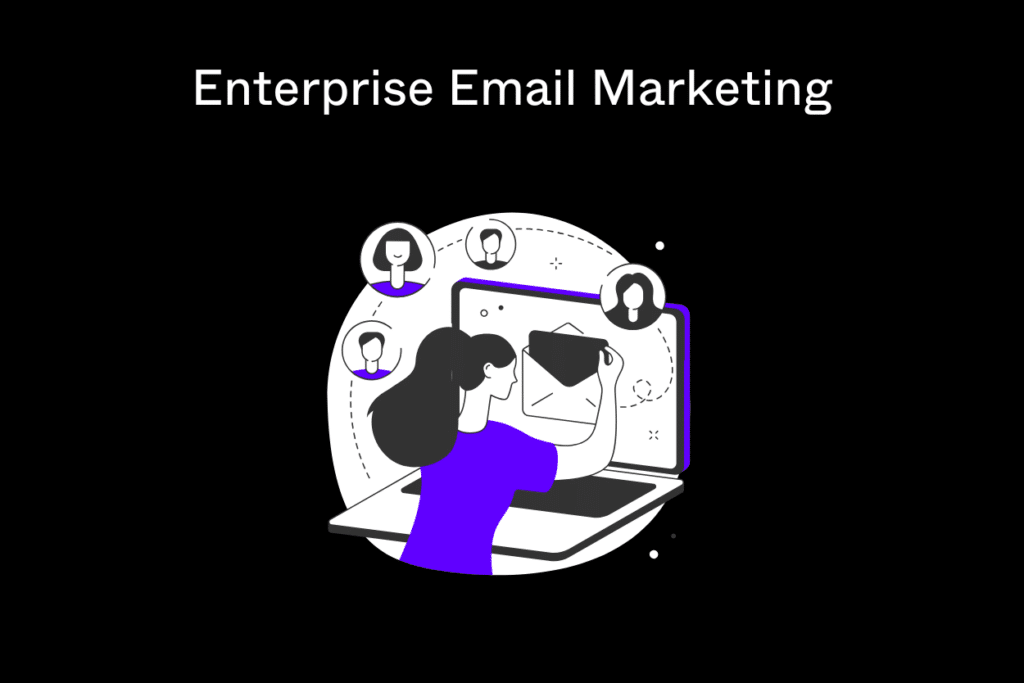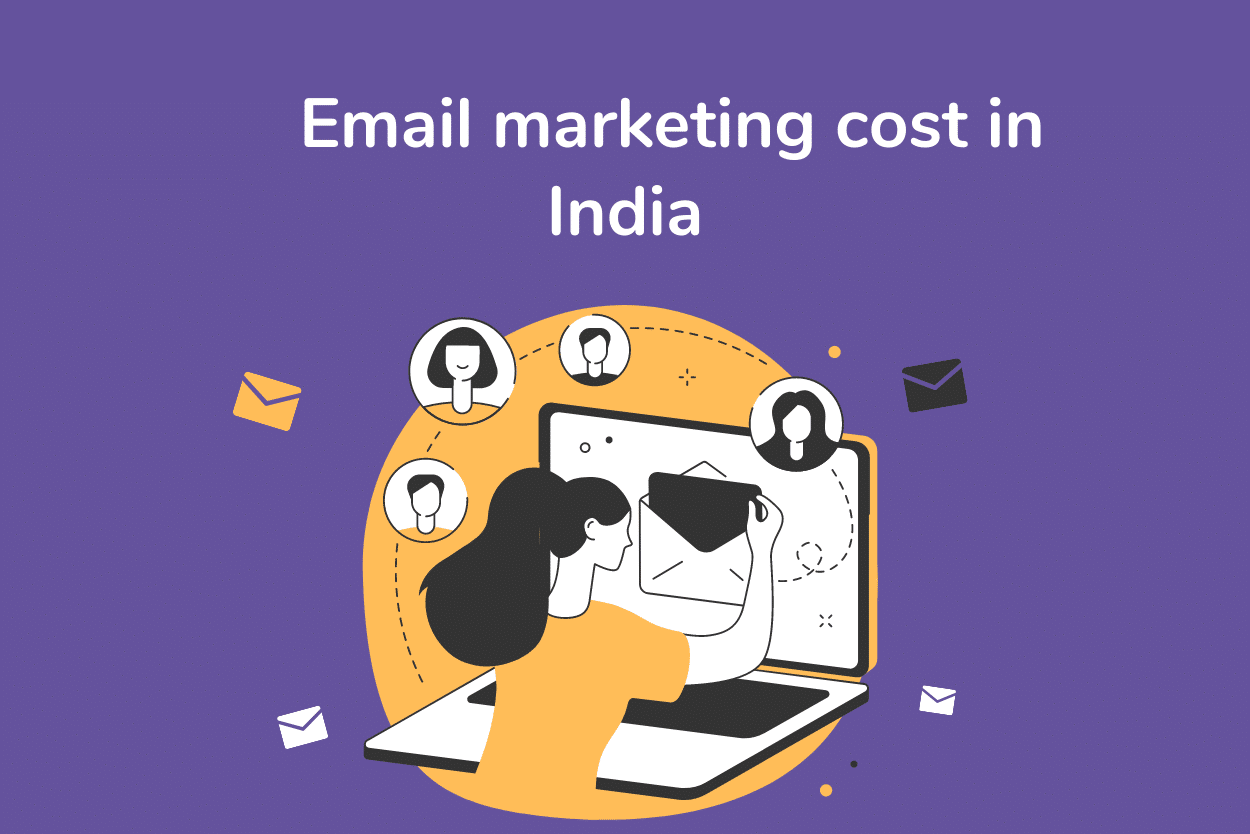
Email marketing has evolved from simple promotional messages to a sophisticated marketing strategy that drives significant business growth. For large organizations, the stakes are even higher, requiring a specialized approach known as enterprise email marketing.
According to Optinmonster, For every $1 spent on email marketing, the average return is $36, delivering a 3600% ROI.
This strategy is essential for companies aiming to engage a vast customer base while ensuring brand consistency and maximizing ROI. This guide delves into what enterprise email marketing is, its importance, types, differences from traditional email marketing, and actionable steps for implementation.
What is Enterprise Email Marketing?
Enterprise email marketing refers to a scalable and sophisticated approach to email campaigns tailored for large organizations. It involves using advanced tools and strategies to manage massive email lists, personalize content, automate workflows, and analyze performance.
Unlike standard email marketing, which may be suitable for small businesses or individual marketers, enterprise email marketing addresses the needs of corporations with millions of subscribers and complex marketing goals.
Why Invest in Enterprise Email Marketing?
Investing in enterprise email marketing offers significant advantages that can revolutionize how large organizations communicate and engage with their audience. It provides scalability, allowing companies to efficiently send large volumes of emails while still delivering a personal touch.
With the power of data analytics and AI, enterprise email marketing enables businesses to personalize content for different audience segments, resulting in higher engagement. This targeted approach not only increases open and click-through rates but also drives more conversions, leading to a higher return on investment (ROI).
Additionally, automation plays a key role, allowing companies to create workflows that ensure timely and relevant communication based on subscriber behaviors, such as purchases or abandoned carts. Consistent and valuable interactions help nurture leads and enhance customer retention, making enterprise email marketing a vital strategy for sustainable growth.
What Are the Types of Enterprise Email Marketing?
Enterprise email marketing can take various forms depending on the goals of the campaign:
1. Welcome Emails
Introduce new subscribers to the brand, set expectations, and provide initial value through special offers or helpful resources.
2. Promotional Emails
Announce sales, discounts, or special events to drive immediate action and sales.
3. Transactional Emails
Include order confirmations, shipping updates, or password resets. These emails provide essential information while offering an opportunity for cross-selling or upselling.
4. Newsletters
Regularly share content that keeps subscribers informed about company updates, industry trends, or educational resources.
5. Re-Engagement Emails
Target inactive subscribers to win them back with exclusive offers or surveys to understand their changing needs.
6. Behavioral Trigger Emails
Based on user behavior, such as browsing activity or past purchases, these emails are triggered to deliver highly relevant content.
How to Start an Enterprise Email Marketing Campaign in 5 Easy Steps
Define Your Goals and Audience
Establish the primary objectives of your email marketing efforts—whether it’s increasing sales, boosting customer retention, or enhancing brand awareness. Segment your audience based on factors like demographics, purchase history, and engagement levels.
Choose the Right Email Marketing Software
Use a robust enterprise email marketing platform that can handle high-volume campaigns, provide automation capabilities, and offer in-depth analytics. Look for features like customer segmentation, personalization options, and integration with other enterprise tools.
Create Compelling Content
Develop content that aligns with your audience’s preferences and stage in the customer journey. Use dynamic content to personalize emails based on subscriber data and encourage actions with strong CTAs (call-to-actions).
Set Up Automation and Personalization
Implement automated workflows for various scenarios, such as welcome sequences, abandoned cart reminders, and post-purchase follow-ups. Use personalization tactics like addressing subscribers by name, suggesting products based on past behavior, and sending content that resonates with their interests.
Measure and Optimize Performance
Track key metrics such as open rates, click-through rates, conversions, and unsubscribe rates. Use A/B testing to find the best-performing subject lines, email designs, and CTAs, continuously optimizing your campaigns based on the data.
How Does Enterprise Email Marketing Differ from Traditional Email Marketing?
Enterprise email marketing differs from traditional email marketing primarily in its scale, tools, integration, and compliance requirements. While traditional email marketing may be suitable for small businesses with basic automation needs, enterprise email marketing manages much larger databases, often reaching millions of subscribers, necessitating advanced segmentation and data management techniques.
The tools used in enterprise email marketing are also more sophisticated, incorporating features like AI-powered content suggestions, predictive analytics, and complex automated workflows to optimize campaign performance. Furthermore, enterprise platforms seamlessly integrate with various business systems such as CRM, e-commerce platforms, and customer data platforms, allowing for a unified flow of data across multiple functions.
Compliance and security are also more stringent in enterprise email marketing, with strict adherence to data protection regulations like GDPR and CAN-SPAM to safeguard sensitive customer information at scale. Together, these elements make enterprise email marketing a more robust and comprehensive approach compared to traditional methods.
Enterprise Email Marketing Software: How to Find the Right Software
Choosing the right software is crucial for the success of enterprise email marketing campaigns. Here are some factors to consider:
- Scalability: The platform should support high-volume email sending without compromising on speed or deliverability.
- Automation and Workflow Capabilities: Look for tools that offer advanced automation, such as triggered emails, customer journeys, and drip campaigns.
- Personalization Features: The software should provide dynamic content capabilities, allowing you to tailor messages based on subscriber data.
- Analytics and Reporting: Choose a platform that offers in-depth analytics to track campaign performance and make data-driven decisions.
- Compliance and Security Features: Ensure the platform is compliant with email marketing regulations and provides robust security measures to protect customer data.
- Integration with Existing Systems: The software should seamlessly integrate with your CRM, e-commerce, and other essential tools.
Read this article to learn about top email marketing softwares.
How to Track the Progress of Enterprise Email Marketing for Your Business
Tracking the success of enterprise email marketing involves monitoring various metrics and adjusting strategies accordingly. Key performance indicators (KPIs) to consider include:
- Open Rate: Measures the percentage of recipients who open your email. It indicates how compelling your subject lines are.
- Click-Through Rate (CTR): Shows the proportion of recipients who clicked on a link within the email, indicating engagement with the content.
- Conversion Rate: Tracks the percentage of recipients who completed a desired action (e.g., making a purchase, filling out a form) after clicking through the email.
- Bounce Rate: Monitors the number of emails that could not be delivered to recipients, reflecting the quality of your email list.
- Unsubscribe Rate: Indicates how many people opted out of your emails, providing insights into whether your content resonates with your audience.
- Revenue Per Email: Measures the average revenue generated per email sent, helping gauge the campaign’s ROI.
Regularly analyze these metrics, use A/B testing to improve performance, and refine your strategies based on the insights gained.
Cost of Enterprise Email Marketing in India and the USA
| Cost Component | India (₹) | USA ($) |
| Monthly Service Fee | ₹30,000 – ₹1,50,000 | $2,000 – $10,000+ |
| Software Subscription (per month) | ₹5,000 – ₹20,000 | $100 – $500+ |
| Advanced Automation and AI Tools | ₹10,000 – ₹50,000 | $200 – $1,000+ |
| Email List Management (per 10,000 subs) | ₹2,000 – ₹10,000 | $50 – $300 |
| Custom Email Design (per template) | ₹1,000 – ₹5,000 | $50 – $200 |
| Compliance and Security Costs | ₹5,000 – ₹15,000 | $100 – $500+ |
| Consultation and Strategy Planning | ₹15,000 – ₹50,000 | $500 – $3,000 |
Conclusion
Enterprise email marketing is a powerful tool for large businesses aiming to build customer relationships, enhance brand loyalty, and boost revenue. It requires a strategic approach that combines sophisticated technology, personalized content, and data-driven decision-making.
By understanding the key elements of enterprise email marketing and implementing the right strategies, businesses can unlock the full potential of this channel to achieve their marketing goals.
Utilizing enterprise-level tools, automation, and analytics, organizations can manage large-scale email marketing campaigns with efficiency and precision, driving sustained business growth.



![Marketing Manager Salary in India: Factors, Benefits, and Career Growth [2025]](https://wdcweb.com/wp-content/uploads/2023/01/Marketing-Manager-Salary-in-India.png)
